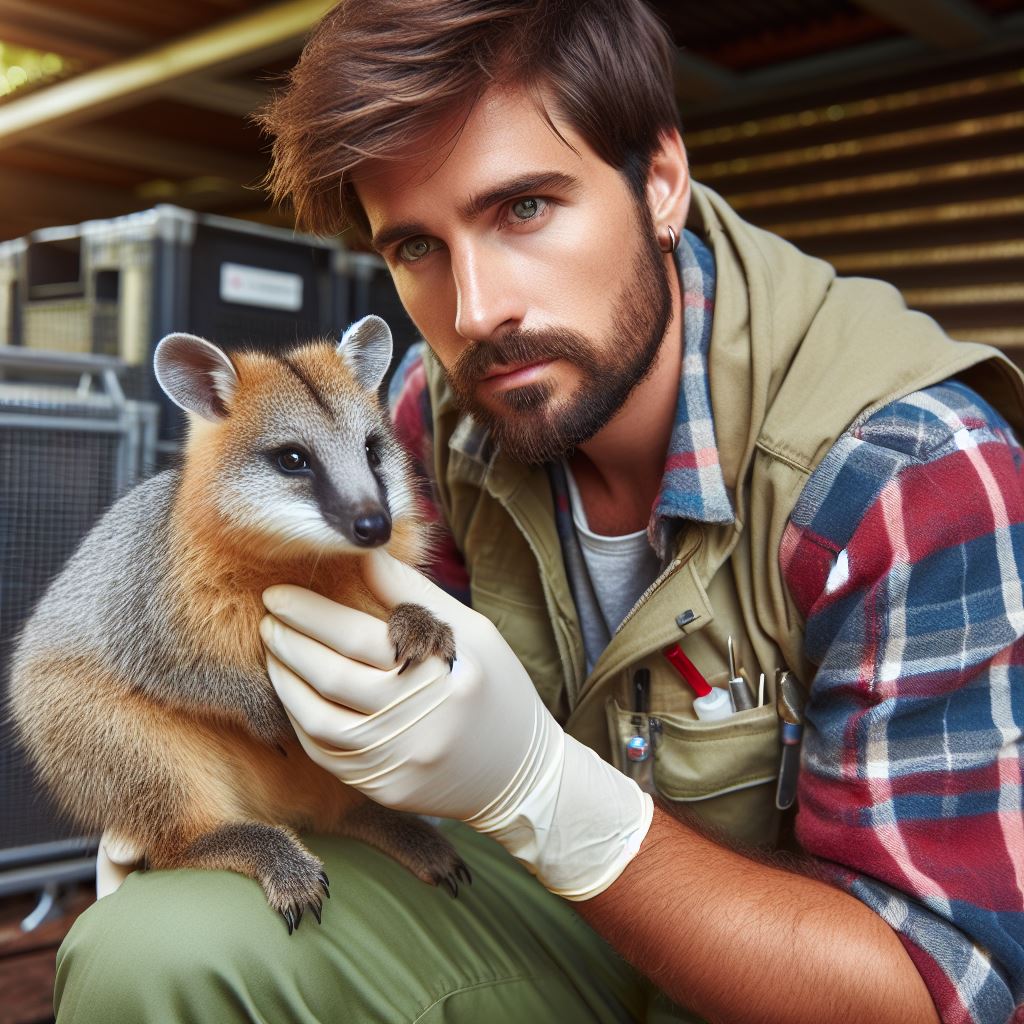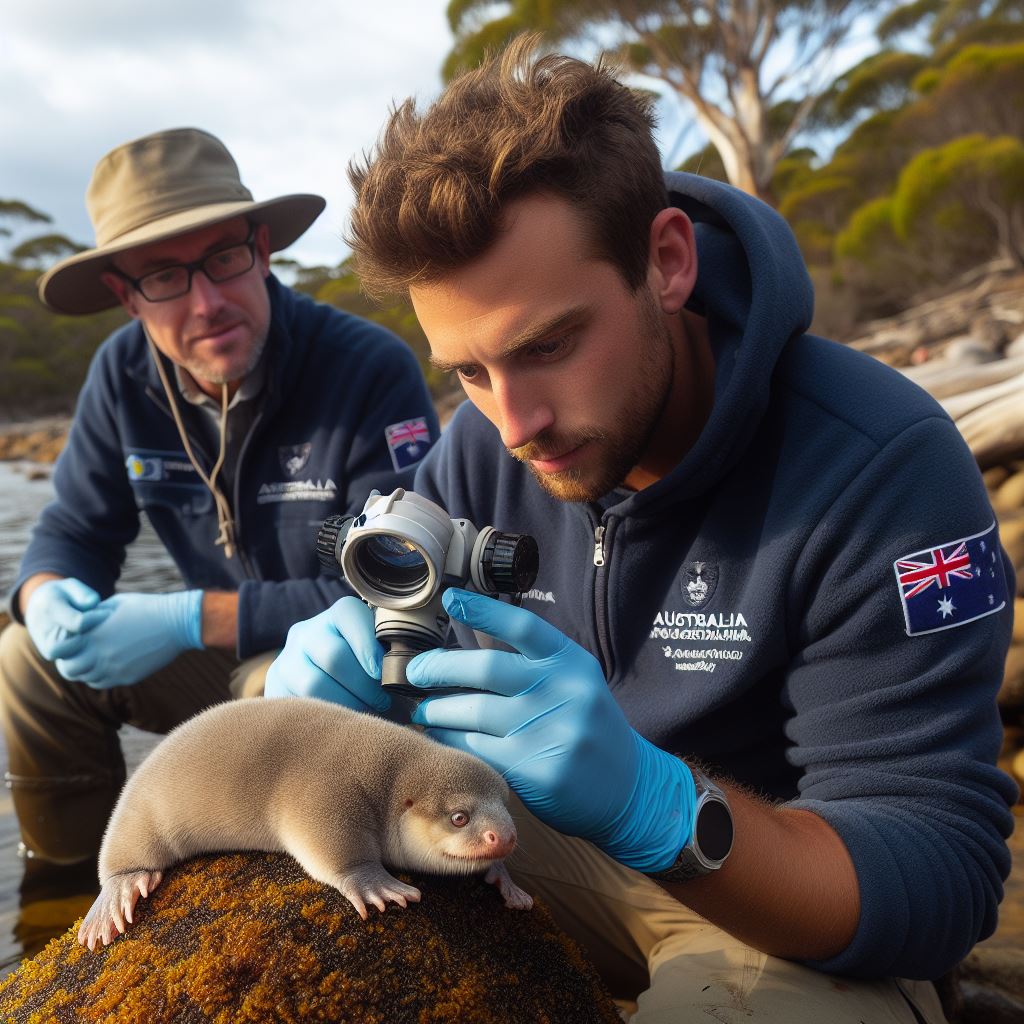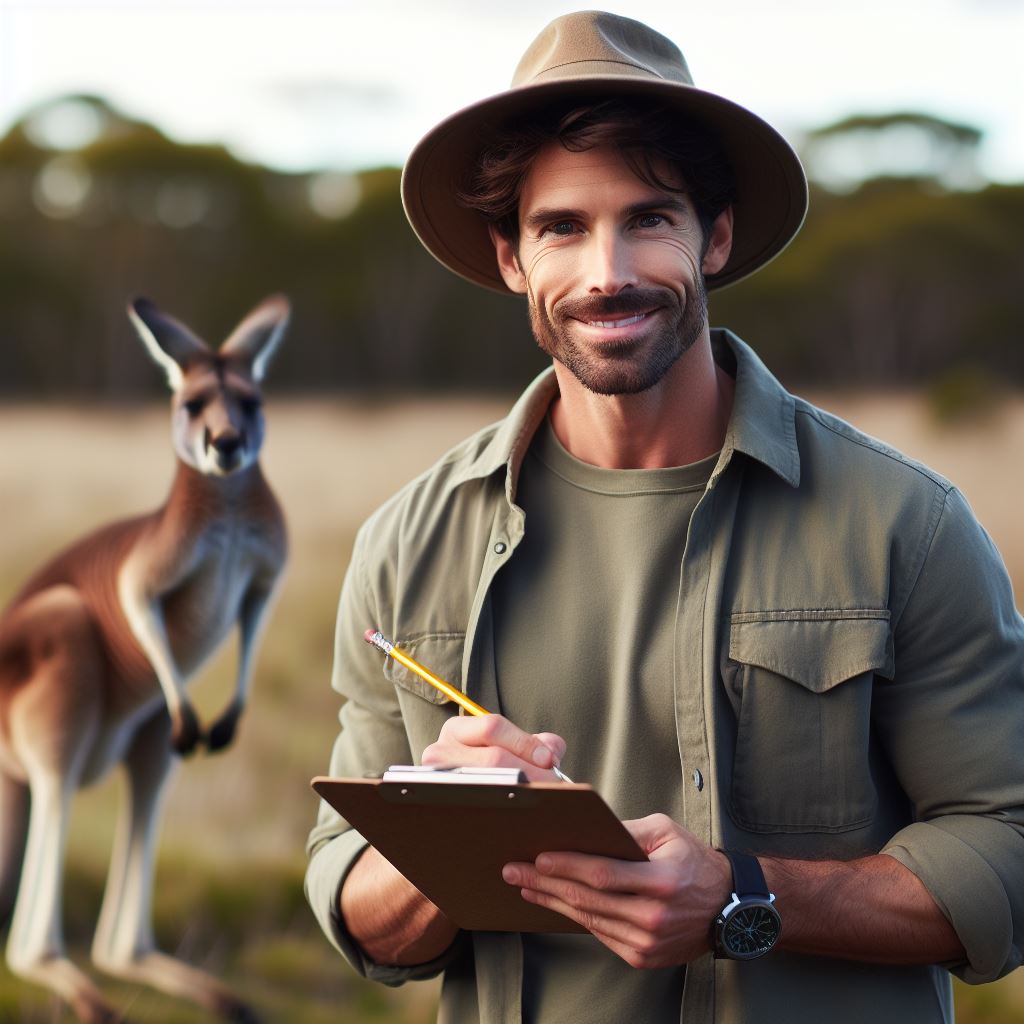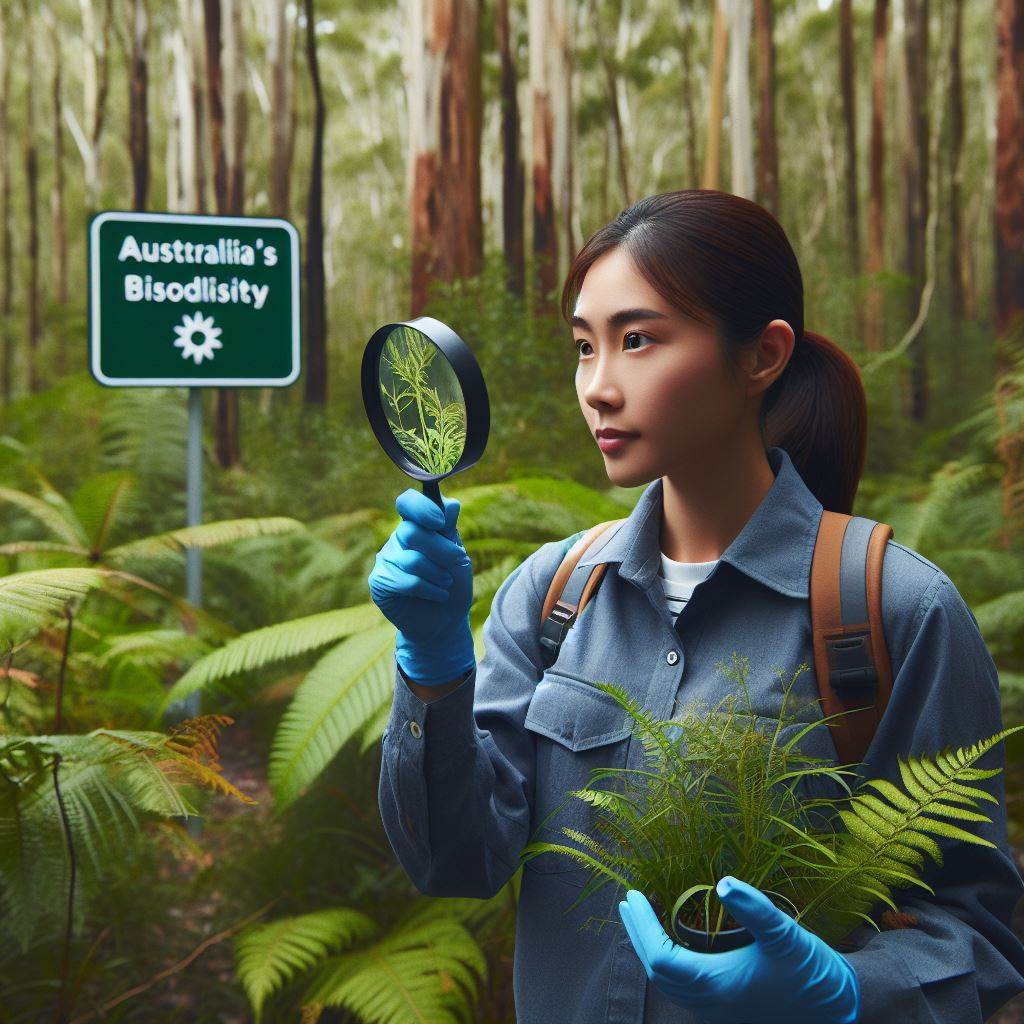Introduction
Wildlife biology, a dynamic field within the realm of biological sciences, entails the study of wild animals and their interactions with the environment.
It encompasses a diverse array of disciplines, including ecology, behavior, genetics, and conservation biology, aimed at understanding and conserving biodiversity.
In Australia, renowned for its rich and unique biodiversity, wildlife biology plays a paramount role in safeguarding its native flora and fauna.
With iconic species like kangaroos, koalas, and the Great Barrier Reef, Australia stands as a global hotspot for biodiversity.
Therefore, wildlife biology in Australia serves as a cornerstone for conservation efforts, habitat management, and species preservation, ensuring the ecological integrity and sustainability of its natural heritage.
The purpose of this blog post is to delve into the multifaceted world of Australian wildlife biology, highlighting its significance, challenges, and ongoing research endeavors.
By offering insights into the pivotal role played by wildlife biologists in understanding and conserving Australia’s unique ecosystems, this post aims to foster a deeper appreciation for the intricate interplay between wildlife and their habitats.
Join us as we embark on an enlightening exploration of Australian wildlife biology, where passion meets purpose in the quest to safeguard the nation’s natural treasures for generations to come.
Overview of Australian Wildlife Biology
Definition and scope of Australian wildlife biology
Australian wildlife biology refers to the study of animals and their ecosystems within Australia’s diverse natural environment.
It focuses on understanding the behavior, habitat, and conservation of native Australian animal species.
Unique characteristics of Australian wildlife
Australian wildlife is known for its high biodiversity and unique species that evolved in isolation. It includes iconic animals like kangaroos, koalas, platypus, and the world’s largest population of marsupials.
Importance of conservation efforts
Conservation efforts in Australian wildlife biology are crucial to protect and preserve the rich biodiversity. The unique species are threatened by habitat loss, invasive species, climate change, and human activities.
Conservation initiatives
- Endangered species protection: Australian wildlife biologists work to protect endangered animals through breeding programs and habitat restoration.
- Ecosystem restoration: Efforts are made to restore damaged ecosystems to create sustainable habitats for native species.
- Threatened species monitoring: Wildlife biologists monitor and track the status of threatened species to assess population dynamics and support conservation measures.
- Public awareness campaigns: Educating the public about the importance of conserving Australian wildlife helps foster a sense of responsibility and encourages participation.
- Research and innovation: Wildlife biologists conduct research to understand animal behaviors, genetics, and ecological interactions, aiding conservation efforts.
Challenges in Australian wildlife biology
- Habitat loss: Rapid urbanization and land clearing for agriculture pose a significant threat to wildlife habitats.
- Invasive species: Non-native species often outcompete native wildlife for resources, causing declines in local populations.
- Climate change: Rising temperatures, changing rainfall patterns, and habitat degradation impact Australia’s unique ecosystems and species.
- Overexploitation: Unsustainable hunting and trading of wildlife can deplete populations and disrupt ecosystems.
- Fragmented landscapes: Isolated habitats increase the vulnerability of wildlife to diseases, loss of genetic diversity, and limited resources.
The future of Australian wildlife biology
- Collaboration: Collaboration between government agencies, conservation organizations, and local communities is essential for effective wildlife conservation.
- Technology and innovation: Advancements in technology, such as remote sensing and DNA analysis, aid in monitoring and understanding wildlife populations.
- Policy and legislation: Strong policies and legislation are necessary to protect habitats, regulate trade, and enforce conservation measures.
- Sustainable practices: Promoting sustainable practices in industries such as agriculture and tourism minimizes the impact on wildlife and their habitats.
- Education and engagement: Raising awareness and promoting public participation in wildlife conservation plays a vital role in safeguarding Australian biodiversity.
In fact, Australian wildlife biology plays a crucial role in studying and conserving the unique fauna of Australia.
Efforts are focused on understanding, protecting, and restoring habitats, as well as raising awareness and promoting sustainable practices.
With collective action and innovative approaches, the future of Australian wildlife biology looks promising for the preservation of this extraordinary natural heritage.
Read: Must-Attend Chemistry Conferences in Aus
Educational Requirements
Undergraduate degree options
- Bachelor of Science in Wildlife Biology
- Bachelor of Environmental Science
- Bachelor of Natural Resource Management
Postgraduate degree options
- Master of Science in Wildlife Biology
- Master of Research in Wildlife Conservation
- Doctorate in Wildlife Biology
Read: Innovative Chemistry Startups in Australia
Career Paths in Australian Wildlife Biology
Wildlife Researcher
- Wildlife researchers have various responsibilities in studying and monitoring wildlife populations.
- They focus their research on areas such as animal behavior, habitat quality, and population dynamics.
- Potential employers for wildlife researchers include universities, research institutions, and government agencies.
Wildlife Ecologist
- Wildlife ecologists have the responsibility of studying and understanding the relationships between wildlife and their environment.
- They conduct ecological field studies to analyze habitat suitability, biodiversity, and ecosystem dynamics.
- Consulting firms and government agencies often employ wildlife ecologists for environmental impact assessments and conservation planning.
Conservation Officer
- Wildlife conservation officers play a crucial role in the preservation and management of wildlife habitats.
- They are responsible for enforcing wildlife protection laws, monitoring endangered species, and implementing conservation programs.
- Employment opportunities for wildlife conservation officers can be found in national parks, wildlife organizations, and government agencies.
As you can see, there are several career paths available in the field of Australian wildlife biology.
Whether you are interested in conducting research, studying ecological relationships, or actively conserving wildlife habitats, there are opportunities for you to pursue in this fulfilling field.
Read: Navigating Chem Grad Studies in Australia

Specializations in Australian Wildlife Biology
In the realm of Australian wildlife biology, there are several specializations that offer unique opportunities for researchers and conservationists.
These specializations focus on specific groups of wildlife in the region and provide valuable insights into their behavior, habitats, and challenges they face.
Marine Wildlife Biology, Avian Wildlife Biology, and Mammalian Wildlife Biology are some of the key areas of expertise within this field.
Marine Wildlife Biology
- The study of marine ecosystems and species is a crucial aspect of marine wildlife biology.
- Researchers in this specialization focus on conservation challenges and conduct important research.
This involves the in-depth study of marine ecosystems and the various species that inhabit them.
This specialization aims to understand the intricacies of these ecosystems, including factors such as biodiversity, habitat structure, and trophic relationships.
By conducting research in this field, marine wildlife biologists contribute to the conservation and management of marine environments.
They strive to address the conservation challenges faced by marine species while also studying their behavior, population dynamics, and habitat requirements.
Avian Wildlife Biology
- Avian wildlife biologists specialize in the study of various bird species and their habitats.
- Migratory bird conservation and understanding their importance is a key area of focus.
Avian Wildlife Biology focuses specifically on bird species and their habitats. Birds play a crucial role in ecosystems as pollinators, seed dispersers, and indicators of environmental health.
Avian wildlife biologists study various aspects of bird biology, including their reproductive behavior, migration patterns, and foraging habits. Understanding the importance of migratory birds is also a key focus within this specialization.
Migratory birds have significant ecological and economic value, and their conservation is vital for maintaining ecosystems and preserving biodiversity.
Mammalian Wildlife Biology
- The study of native Australian mammals plays a central role in mammalian wildlife biology.
Mammalian Wildlife Biology centers on the study of native Australian mammals.
This specialization involves research on their behavior, ecology, and population dynamics.
Mammalian wildlife biologists work to unravel the complex interactions between these mammals and their environment.
Additionally, they investigate the impact of invasive species on native mammalian populations.
Invasive species pose a significant threat to indigenous mammals, disrupting ecosystems and leading to biodiversity loss.
By studying these interactions, wildlife biologists can better develop strategies for conserving and protecting native mammal populations.
Specializations in Australian wildlife biology offer exciting and rewarding career paths for those passionate about the conservation and study of unique ecosystems and species.
Whether conducting research in marine environments, studying bird behavior, or investigating the impact of invasive species on mammals, these specialists contribute invaluable knowledge to the field.
By understanding the intricacies and challenges faced by different wildlife populations, wildlife biologists can work towards effective conservation and management strategies.
Through their efforts, they strive to protect and preserve Australia’s rich biodiversity for future generations.
Read: Balancing Lab Work and Life in Australia
See Related Content: Physics Outreach Programs in Australia
Your Personalized Career Strategy
Unlock your potential with tailored career consulting. Get clear, actionable steps designed for your success. Start now!
Get StartedSkills and Qualities Required
A successful career in Australian Wildlife Biology requires a combination of essential skills and qualities. Here are some key areas to focus on:
Fieldwork Skills
- Demonstrate proficiency in field studies, including survey techniques, data collection, and species identification.
- Master the use of equipment such as GPS, camera traps, and radio telemetry for tracking wildlife.
- Develop expertise in navigating various terrains and environments, including remote and challenging locations.
- Acquire knowledge of identifying signs of animal behavior and adapting research methods accordingly.
Data Analysis and Research Skills
- Possess strong analytical skills to effectively interpret data collected during field studies.
- Utilize statistical software and techniques to analyze data and draw meaningful conclusions.
- Employ critical thinking to design research projects and develop appropriate methodologies.
- Stay updated with the latest research methodologies, technologies, and best practices in data analysis.
Communication and Teamwork Skills
- Effectively communicate research findings through scientific reports, presentations, and publications.
- Demonstrate proficiency in writing grant proposals and securing funding for research projects.
- Collaborate with colleagues and experts from different disciplines to enhance research outcomes.
- Work well in team environments, displaying strong interpersonal skills and the ability to delegate and coordinate.
Passion for Wildlife Conservation
- Cultivate a deep-rooted passion and genuine concern for the conservation of Australian wildlife.
- Stay informed about the current challenges and threats faced by native species and their habitats.
- Advocate for sustainable practices and policies that promote wildlife conservation and ecological balance.
- Engage in community outreach and education programs to raise awareness about wildlife conservation.
Developing these skills and qualities will not only make you a competitive candidate in the field of Australian Wildlife Biology but also enable you to make a significant contribution to the conservation of precious and unique wildlife in Australia.
See Related Content: How to Become a Chemist in Australia
Learn More: Top Aussie Universities for Physics Studies
Job Prospects and Salary Range
- Growing demand for wildlife biologists in Australia
- Salary range for various positions
- Factors influencing job prospects
Growing Demand for Wildlife Biologists in Australia
The field of wildlife biology is experiencing a rapid growth in demand in Australia.
This is primarily due to increased awareness about environmental conservation and the need to protect Australia’s unique and diverse wildlife population.
Wildlife biologists play a crucial role in studying and preserving these species, making their expertise highly sought-after in various sectors.
Salary Range for Various Positions
The salary range for wildlife biology positions in Australia can vary depending on factors such as education, experience, and job location.
Entry-level positions in research or government agencies typically start around $50,000 to $60,000 per year.
With more experience and advanced degrees, wildlife biologists can earn salaries ranging from $70,000 to $100,000 or more.
Factors Influencing Job Prospects
Several factors influence job prospects for wildlife biologists in Australia.
Firstly, the demand for these professionals is closely tied to government policies and initiatives related to conservation and wildlife management.
Consequently, changes in legislation or funding can significantly impact job opportunities.
Additionally, the location of employment can play a role, as certain regions or organizations may have a higher demand for wildlife biologists than others.
Lastly, advanced degrees and specialized skills can greatly enhance job prospects and open doors to more lucrative positions.
In general, the field of wildlife biology offers promising job prospects in Australia.
The growing demand for these professionals is fueled by the urgent need to protect the country’s unique wildlife population.
While salaries can vary based on factors such as education and experience, wildlife biologists can expect competitive compensation.
However, it is important to consider external factors such as government policies and location when planning a career in this field.
With the right qualifications and a passion for wildlife conservation, aspiring wildlife biologists can forge rewarding careers in Australia.
Conclusion
The importance of Australian wildlife biology careers cannot be overstated.
These professionals play a vital role in conserving Australia’s unique and diverse wildlife.
If you are passionate about wildlife and conservation, pursuing a career in Australian wildlife biology can be incredibly rewarding.
There are numerous opportunities for growth and making a difference.
Wildlife biology has the potential to greatly impact Australia’s conservation efforts.
By studying and understanding the behaviors, habitats, and needs of different species, we can develop effective conservation strategies and protect our valuable wildlife.
In closing, Australian wildlife biology careers are crucial for the preservation of our natural heritage.
Through their dedication and expertise, wildlife biologists contribute to the conservation of diverse ecosystems and promote harmony between humans and wildlife.
If you have a passion for the environment and a love for animals, consider pursuing a career in this exciting field.
Together, we can make a significant difference in safeguarding Australia’s unique wildlife for future generations.




